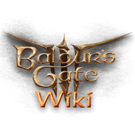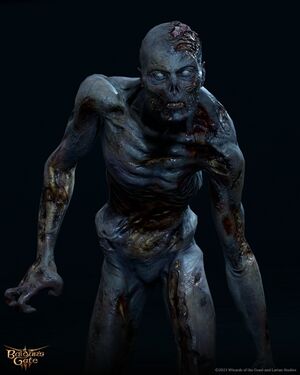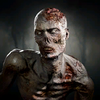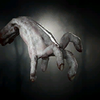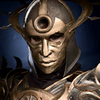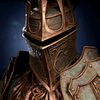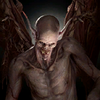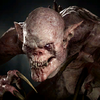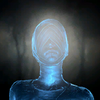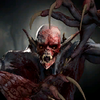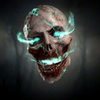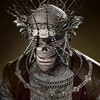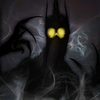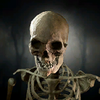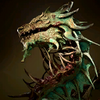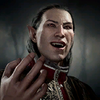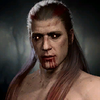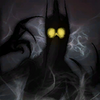More actions
Undead are a type of creature that has died and been brought back through magical or spiritual means. They can be frequently found throughout Baldur's Gate 3, most notably during Act Three, and may be created through various spells and actions available to players and NPCs.
Characteristics[edit | edit source]
Most undead are reanimated from formerly living creatures, and generally exist between the realms of the living and the dead. As such, certain damage types or status effects that would normally be effective against organic creatures are ineffective against undead creatures. ![]() Poison and
Poison and ![]() Necrotic resistances appear quite commonly, and some are often immune to Poison or Necrotic damage, or both. Similarly, they are unaffected by many conditions such as and .
Necrotic resistances appear quite commonly, and some are often immune to Poison or Necrotic damage, or both. Similarly, they are unaffected by many conditions such as and .
Conversely, almost all healing effects including , , and have no effect on undead. However, potions can still heal them.
Types of undead[edit | edit source]
Crawling Claw[edit | edit source]
Crawling claw and reanimated severed limbs, usually created to perform menial tasks as a servant by dark wizards. Lacking a brain, crawling claws don't possess intelligence although they can still hear and understand basic commands.
Crawling claws in Baldur's Gate 3[edit | edit source]
Dark Justiciar[edit | edit source]
Dark Justiciar are elite warriors who serve Shar, even after death. They can be found mainly in the Gauntlet of Shar in Act Two, as well as corpses in Grymforge during Act One.
Dark Justiciars in Baldur's Gate 3[edit | edit source]
Death Knight[edit | edit source]
Death knights are reanimated warriors, often created from characters who were evil in life. They appear fully clad in armour, which hides their rotting skin such that only their eyes show through as pinpoints of light. Death knights were most often created from paladin-type characters.
Death knights in Baldur's Gate 3[edit | edit source]
Flying Ghoul[edit | edit source]
Flying Ghouls are flying variants of the regular Ghoul. They have large jagged wings and often swoop down to consume humanoid corpses
Flying ghouls in Baldur's Gate 3[edit | edit source]
Ghast[edit | edit source]
Ghasts are very similar to ghouls - humanoid creatures that can paralyze their foes with their claws and teeth. They are generally more cunning and deadly, but carry the stench of rotting flesh. This stench is so severe it can cause nausea, and even paralysis.
Ghasts in Baldur's Gate 3[edit | edit source]
Ghost[edit | edit source]
Ghosts are spirits that are bound to someone or some place, either from being denied a proper burial or by having unfinished business when they died. Being incorporeal, they can fly and pass through solid objects as they please.
Ghosts in Baldur's Gate 3[edit | edit source]
Ghoul[edit | edit source]
Ghouls are humanoid looking carnivorous creatures that devour corpses and hunger for the flesh of living beings. They have long sharp teeth, and can paralyze their prey with claw or bite wounds.
Ghouls in Baldur's Gate 3[edit | edit source]
Grim Visage[edit | edit source]
Grim visages are floating skulls created from various aspects of Gerringothe Thorm's personality to guard her coins. There are 6 of them, and defeating them removes armor from Gerringothe.
Grim Visages in Baldur's Gate 3[edit | edit source]
Mummy[edit | edit source]
Mummies are undead creatures created from preserved, mummified corpses. They retain the bandages that wrapped and preserved the original body, but are in various stages of extreme decay. If attacked by a mummy, a condition known as mummy rot may be inflicted.
Mummies in Baldur's Gate 3[edit | edit source]
Mummy Lord[edit | edit source]
Mummy lords are more powerful, intelligent versions of Mummies that are created from powerful and/or evil creatures. If defeated, they will automatically reform in their lair unless their desiccated hearts are destroyed by found and destroyed by fire.
Mummy Lords in Baldur's Gate 3[edit | edit source]
Shadow[edit | edit source]
Shadows are dark, incorporeal creatures that can be frequently found in Act Two. They are twisted remnants of once living creatures that are twisted by the shadow curse. When defeated, they frequently leave behind a Shadow Vestige which details fragments of the shadow's former life.
Shadows in Baldur's Gate 3[edit | edit source]
Skeleton[edit | edit source]
Skeletons are a commonly encountered form of undead. They are animated from a corpse of a creature that is devoid of flesh. Consisting of mainly brittle bones, skeletons are vulnerable to ![]() Bludgeoning damage and can be created through various magic spells.
Bludgeoning damage and can be created through various magic spells.
Skeletons in Baldur's Gate 3[edit | edit source]
- Agile Guardian
- Apostate Destroyer
- Apostate Defender
- Apostate Librarian
- Apostate Sentinel
- Bloodmarrow Skeleton
- Chatterteeth
- Death Shepherd
- Entombed Scribe
- Entombed Warrior
- Giant Skeleton
- Godey
- Infernal Mason
- Necromite
- Reconstituted Arcanist
- Reconstituted Duellist
- Reconstituted Marksman
- Robust Guardian
- Withers
Undead Dragon[edit | edit source]
Undead dragons are extremely rare dragon creatures reanimated using extremely powerful magic. Their bodies are skeletal in appearance, and they retain much of their abilities and magic as they did in their previous life.
Undead dragons in Baldur's Gate 3[edit | edit source]
Vampire[edit | edit source]
Vampires are powerful undead creatures with pale-skin, blood-red eyes, and sharp canine teeth which they use to pierce and drink the blood of their victims. They also have sharp claws and can regenerate, as well as turn other humanoid creatures into vampire spawn by feeding on them. Most notably however, they are sensitive to sunlight and their skin will burn in its presence.
Vampires in Baldur's Gate 3
Vampire Spawn[edit | edit source]
Vampire spawn are creatures created when a vampire bites and drinks the blood of a humanoid creature. They have some of the features of a vampire such as sensitivity to light and a hunger for blood, but have no free-will unless their master is killed or their freedom is granted.
Vampire spawn in Baldur's Gate 3
Wraith[edit | edit source]
Wraiths are similar in appearance to Shadows, and can also be found in Act Two. In combat, Wraiths will frequently teleport from shadow to shadow. They will also generate an which snuffs out nearby light sources and can drain the life of their enemies.
Wraiths in Baldur's Gate 3[edit | edit source]
Zombie[edit | edit source]
Zombies are a common form of undead similar to Skeletons except they still retain significant amounts of flesh. Mindless and often missing body parts, zombies can be created from most living creatures and they usually form the backbone of any necromancer's army. Zombies can be difficult to kill, often reviving after receiving a fatal blow.
Zombies in Baldur's Gate 3[edit | edit source]
Other[edit | edit source]
Related items[edit | edit source]
 Arrow of Undead Slaying - double damage against undead creatures
Arrow of Undead Slaying - double damage against undead creatures Blade of Oppressed Souls - won't apply Crown of Madness to undead
Blade of Oppressed Souls - won't apply Crown of Madness to undead Doom Hammer - prevents healing and applies disadvantage to their attacks
Doom Hammer - prevents healing and applies disadvantage to their attacks Gandrel's Aspiration - allows ranged weapon attacks to turn undead
Gandrel's Aspiration - allows ranged weapon attacks to turn undead Hammer of the Just - additional slashing damage against undead
Hammer of the Just - additional slashing damage against undead Holy Water - Deals 3d6
Holy Water - Deals 3d6 Radiant damage against undead
Radiant damage against undead Planeslayer Flail (inaccessible) - bonus damage and attack roll against undead
Planeslayer Flail (inaccessible) - bonus damage and attack roll against undead Resonance Stone - does not affect undead
Resonance Stone - does not affect undead Sword of Life Stealing - target takes additional
Sword of Life Stealing - target takes additional  Necrotic damage unless it is undead
Necrotic damage unless it is undead The Blood of Lathander - blinds nearby undead creatures
The Blood of Lathander - blinds nearby undead creatures The Long Arm of the Gur - bonus to attack and damage against undead
The Long Arm of the Gur - bonus to attack and damage against undead The Oak Father's Embrace - deals
The Oak Father's Embrace - deals  Radiant damage to undead creatures that hit the wearer
Radiant damage to undead creatures that hit the wearer The Sacred Star - turns undead creatures if they fail a saving throw.
The Sacred Star - turns undead creatures if they fail a saving throw. The Undead Bane - deals additional damage and applies to undead
The Undead Bane - deals additional damage and applies to undead Veil of the Morning - undead have disadvantage against the wearer, and the wearer has advantage against saving throws from undead creatures
Veil of the Morning - undead have disadvantage against the wearer, and the wearer has advantage against saving throws from undead creatures
Related spells and abilities[edit | edit source]
- - nearby undead deal Charisma modifier additional damage with weapon attacks
- - Undead receive disadvantage on attack rolls.
- - forces an undead corpse to explode, creating a
 Cloudkill cloud
Cloudkill cloud - - undead are not paralyzed by the attack
- - must be used on undead
- - takes control of target undead for a period of time
- - grants advantage on attack rolls against undead
- - deals an additional 1d6
 Radiant to undead
Radiant to undead - - deals an extra 1d4
 Radiant damage per turn
Radiant damage per turn - - grants nearby undead resistance to
- - Controls an undead but kills it at the end of battle
- - Raises a fallen undead creature with half its hit points
- - undead have disadvantage against the target
- - grants nearby undead resistance to
- - Forces nearby undead to flee
- - Forces nearby undead to flee
- - allied undead become resistant to
 Bludgeoning,
Bludgeoning,  Slashing, and
Slashing, and  Piercing damage.
Piercing damage.
